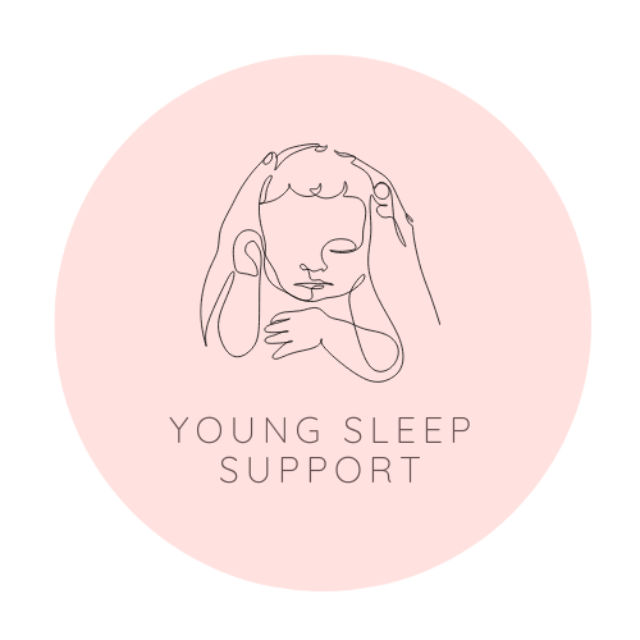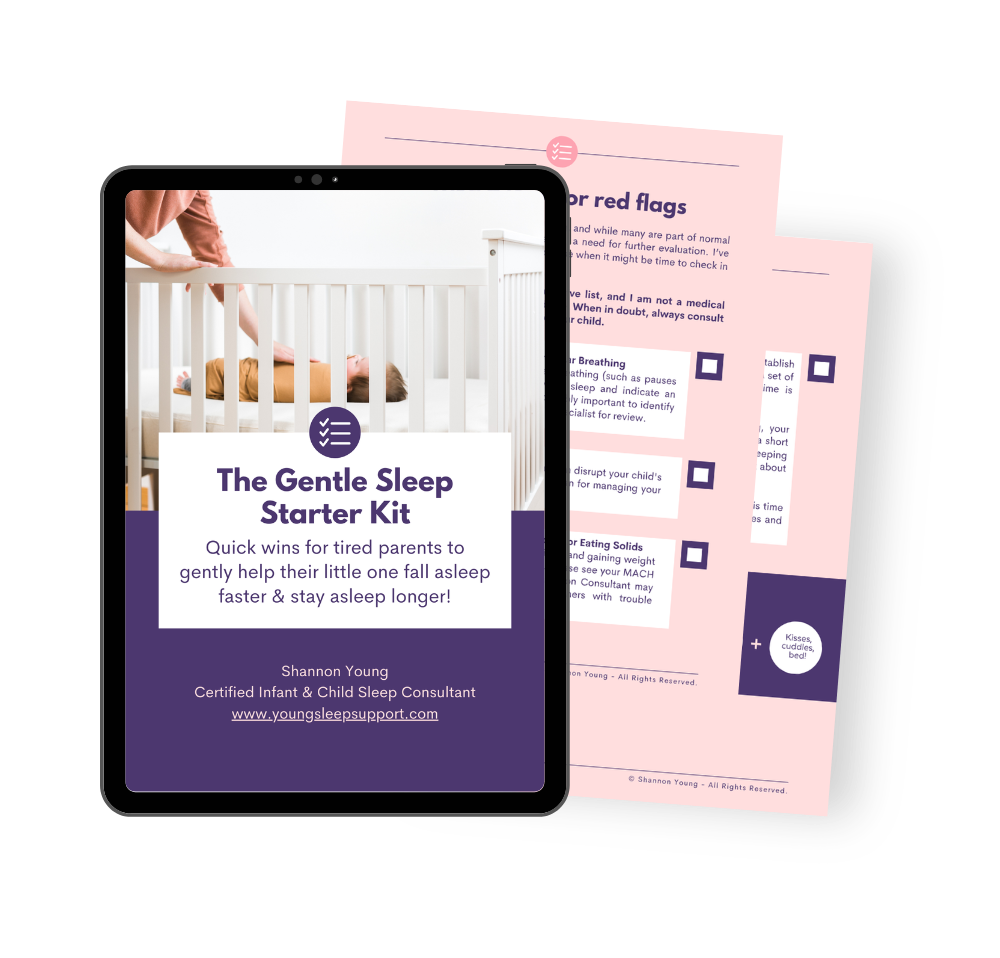The overtiredness myth that's actually ruining your baby's sleep

Let's talk about overtiredness.
You're watching your baby carefully for the first yawn. The second you see those sleepy cues, you're moving them toward sleep because you've been told that if you miss the "sleep window," things will fall apart.
You're following wake windows diligently. Your baby is 4 months and 2 days old, so they can be awake for 1 hour and 45 minutes. You've read it everywhere. You're doing everything right.
You've heard the warnings:
"An overtired baby won't sleep."
"You have to catch them before they get overtired."
"Missing the sleep window means disaster."
And so you're living your life in careful increments, watching the clock, trying so hard to get this right.
But despite doing everything "by the book," sleep still isn't working. And you're exhausted.
Here's what I wish someone had told me (and what I want to tell you now): The information you've been given about overtiredness, while well-intentioned, might actually be part of the problem.
Let me explain.
What we've been told about overtiredness
The overtiredness narrative goes something like this:
When babies get too tired, their bodies release cortisol (the stress hormone). This cortisol makes them wired and unable to settle. They fight sleep. They cry. They wake frequently overnight. It's a disaster.
Therefore, you must put your baby down for sleep at the first sign of tiredness, follow wake windows carefully, and never let them get overtired.
And look, there IS some truth to this.
Genuine overtiredness (the kind where your baby is so exhausted they are just completely dysregulated) does make sleep harder. I'm not denying that at all.
But here's what's happened: the sleep training industry has taken a kernel of truth and turned it into something that has parents (understandably) worried about letting their babies get tired at all.
And without meaning to, this can create a different problem entirely.
The unintended consequence: Babies who aren't quite tired enough
Here's what I see often in my practice, and I say this with so much love and compassion because these are parents who are trying SO hard:
Parents who are doing everything "right" - following wake windows carefully, responding to every tired cue, being so attentive - and yet:
- Bedtime takes 45 minutes of rocking, bouncing, and patience
- Their baby seems to resist every single nap
- Night sleep is fragmented with frequent waking
- Their baby is awake for long stretches in the middle of the night
- Early morning waking (4:30-5:30am) has become the norm
And when we look at their baby's day together, we often find:
- Bedtime is quite early (sometimes 6pm or earlier)
- Daytime naps are adding up to 3-4 hours past the newborn stage
- Baby is being offered sleep at the earliest signs of tiredness
- Total sleep in 24 hours is actually quite high
And here's the thing: None of this is the parent's fault.
They've been given information that made them (reasonably) worried about overtiredness. They're following advice they've been given. They're doing their absolute best.
But sometimes, the issue isn't that baby is getting overtired. It's that they don't quite have enough sleep pressure built up yet.
Understanding sleep pressure (and why it matters)
Let's talk about what sleep pressure actually is, because understanding this can be really helpful.
Sleep pressure (also called sleep drive or homeostatic sleep pressure) is your body's need for sleep. The longer you're awake, the more it builds. When it's high enough, you fall asleep. When you sleep, it empties out.
Think of it like hunger. The longer it's been since you ate, the hungrier you get. When you're genuinely hungry, eating is easy and satisfying. But if you try to eat a big meal when you're not actually hungry yet, it's hard work.
Sleep is similar.
Here's the important part: If sleep pressure isn't quite high enough yet, sleep won't come easily.
You can have the perfect sleep environment, the most calming bedtime routine, and the gentlest settling approach. But if your baby's body isn't quite ready for sleep yet, it's going to be a struggle.
It's like trying to go to bed at 6pm as an adult when you woke up at 10am and had a 2-hour nap in the afternoon. Your body just isn't ready, no matter how perfect your bedroom is.
How the fear of overtiredness can accidentally create this problem
When we're (understandably) worried about overtiredness, here's what can happen without us realising:
Wake windows become rules instead of guides
Wake windows are averages based on anecdotes. They're really helpful starting points.
But they're not one-size-fits-all rules.
And they're not evidence based.
Some babies genuinely need more awake time than the "average." Some need less. And those needs change based on:
- How well they slept the night before
- How long their naps were that day
- Their individual sleep needs (which vary quite a bit between babies)
- Their age and current development
- Their unique temperament
When we follow wake windows as strict rules, we might sometimes be offering sleep when our particular baby isn't quite ready yet.
Every cue gets interpreted as tiredness
Babies yawn for lots of reasons:
- They're tired (yes, sometimes this is it)
- They're bored or understimulated
- They're processing new information
- They just yawn (it's a normal human thing)
Eye rubbing? Could be tired. Could also be:
- Itchy eyes
- Exploring their face
- Teething discomfort
- Just rubbing their eyes
When we're worried about missing the sleep window, it's natural to interpret every cue as "time for sleep now." But sometimes, our baby is just... being a baby.
We prioritise sleep protection above everything else
I see parents who (with the very best of intentions):
- Feel anxious about leaving the house in case it interferes with nap time
- Keep their baby in calm, quiet environments all day to "protect sleep"
- Limit activities because they're worried about overstimulation
- Offer sleep every 90 minutes like clockwork
And so sleep doesn't improve. But here's the thing: Babies need awake time that's engaging and appropriately stimulating to build the sleep pressure they need.
If your baby is spending most of their awake time in very calm, quiet environments with minimal activity, they might not be building quite enough sleep pressure.
This isn't your fault if you've been doing this. You were trying to help your baby sleep better. The advice just wasn't quite complete.
What genuine overtiredness actually looks like
I want to be really clear here: Overtiredness is absolutely real. I'm not saying it doesn't exist or that you shouldn't be aware of it.
But it's often not what we think it is.
Genuine overtiredness looks like:
- A baby who is so exhausted they're becoming dysregulated (crying that's hard to soothe, unable to calm down)
- A baby who has been awake for significantly longer than appropriate for their age (we're talking hours beyond what's typical, not 15 minutes)
- A baby who has missed multiple sleep opportunities and is now running on empty
- A baby whose nervous system has moved into stress mode
Genuine overtiredness usually does NOT look like:
- A baby who's been awake for 2 hours instead of 1 hour 45 minutes
- A baby who yawned once or twice
- A baby who rubbed their eyes briefly
- A baby who's been awake for an age-appropriate amount of time and is showing some tired signs but is still generally content
The key difference? Regulation.
A genuinely overtired baby is dysregulated. Their nervous system is overwhelmed. They're not just tired, they're distressed.
A baby who's appropriately tired (even if they've been awake slightly longer than a chart recommends) is still regulated. They might be showing tired cues, they might get a little fussy, but they're not falling apart.
Signs your baby might need a bit more awake time
Here's how to tell if your baby might benefit from slightly longer wake windows (and I say this gently, with no judgment):
✅ Bedtime takes a long time (more than 20-30 minutes of settling)
✅ Your baby seems to resist naps consistently (not just occasionally, but most of the time)
✅ Split nights (your baby is awake for 1-3 hours in the middle of the night, seeming alert rather than distressed)
✅ Early morning waking (consistently waking before 6am, bright-eyed and ready to go)
✅ Short naps (consistently 30-45 minutes, and is happy and alert during their wake windows rather than cranky)
✅ Bedtime resistance (your baby seems wide awake at bedtime, not showing tired signs)
✅ You're following wake windows carefully but sleep still isn't working
If you're seeing these patterns, it might be worth experimenting with slightly longer awake times.
Not because you've been doing anything wrong. Just because your baby might be showing you they need something a bit different than the average.
How to build appropriate sleep pressure gently
So how do you find the right balance? How do you build enough sleep pressure without worrying about going too far?
Use wake windows as a starting point, not a finish line
Look at the recommended wake windows for your baby's age. Use them as a helpful guide.
Then watch your baby. Are they showing multiple tired cues (not just one yawn, but several signs together)? Are they starting to get fussy or lose focus?
If they're still happy, engaged, and content at the end of the "recommended" wake window, they might be telling you they need a bit more time.
Look for clusters of tired cues, not just one
Real tired cues often come in groups:
- Multiple yawns close together
- Decreased activity and engagement
- Fussiness that's building
- Losing interest in toys or interaction
- Staring off into space
- Wanting to be held more
One yawn on its own? Probably not a tired cue yet. Three yawns in five minutes plus rubbing eyes and getting fussy? That's more likely heading towards genuine tiredness.
Consider the quality of awake time
A baby who's been awake for 2 hours but spent most of it in a carrier while you walked around might not have built as much sleep pressure as a baby who spent 1.5 hours actively playing, practicing new skills, and engaging with you.
Active, engaging awake time builds more sleep pressure than passive awake time.
This doesn't mean you need to entertain your baby every second. Just that some variety and engagement during wake times can be helpful.
Look at the whole 24-hour picture
If your baby is:
- Taking 3+ hours of daytime naps past the newborn stage
- Going to bed quite early (6-6:30pm)
- Waking very early (5-5:30am)
- Having split nights or bedtime battles
Then you might be aiming for more total sleep than their body actually needs right now. This means there isn't quite enough sleep pressure for consolidated nighttime sleep.
It might be worth considering whether a small adjustment to daytime sleep or bedtime could help create better balance.
Make changes gradually and gently
If you think your baby might benefit from more awake time, please don't suddenly make huge changes.
Try adding just 10-15 minutes to your wake window and see what happens. If sleep improves, you're on the right track.
If it gets worse, you can easily adjust back. No harm done.
Trust your baby's feedback
If you extend a wake window slightly and your baby:
- Falls asleep more easily
- Sleeps longer stretches
- Seems more settled overall
That's your baby telling you this is working for them.
If you extend a wake window and your baby:
- Becomes genuinely distressed
- Has a much harder time settling
- Seems dysregulated
That's feedback that this particular baby needs shorter wake windows right now. And that's okay too. Every baby is different.
What about the "sleep window"?
You've probably heard about the sleep window - that narrow window of time where your baby will fall asleep easily, and if you miss it, everything becomes much harder.
Here's what I've observed: When a baby has appropriate sleep pressure, the "window" is actually more flexible than we've been told.
Yes, there's an optimal time when sleep will come most easily. But if you're a few minutes past it, your baby isn't suddenly going to be unable to sleep.
The "sleep window" only feels impossibly narrow when sleep pressure isn't quite high enough to begin with.
When sleep pressure is appropriate for your baby, you have more flexibility. They might take a bit longer to settle if you're slightly past the optimal time, but they'll still be able to get there.
The role of nervous system regulation
Here's something really important that often gets missed:
It's not overtiredness itself that prevents sleep. It's dysregulation.
When a baby is genuinely overtired, their nervous system becomes dysregulated. Stress hormones rise. They move into fight-or-flight mode. And yes, this makes sleep much harder.
But you can have a baby who's been awake for an appropriate (or even slightly longer) amount of time who is still regulated. They're tired, but they're calm. Their nervous system is still in rest mode.
This baby will be able to sleep, even if they've been awake a bit longer than a chart recommends.
The key is supporting regulation throughout the day:
- Calm, connected awake time (engaging but not overwhelming)
- A soothing wind-down routine before sleep
- Responsive settling that helps them feel safe
- An environment that supports rest
When you focus on keeping your baby regulated rather than worrying over exact wake times, sleep often improves naturally.
Finding your baby's unique sweet spot
Every baby is genuinely different. Some babies do need shorter wake windows. Others need much longer ones.
Your job isn't to follow a chart perfectly. Your job is to figure out what YOUR baby needs.
And you're the expert on your baby, even if it doesn't always feel that way.
Here's how to find their sweet spot:
Keep a simple log for a week
Track:
- Wake times
- Nap times and lengths
- Bedtime
- Night wakings
- How easily they fell asleep
- Their mood during awake time
Look for patterns. When did they fall asleep easily? When did they resist? When did they sleep longer stretches?
Experiment gently
Try extending one wake window by 10-15 minutes. See what happens. Did sleep improve or get harder?
Try adjusting one thing at a time so you can see what's actually making a difference.
Trust your observations
If your baby consistently falls asleep easily and sleeps well with wake windows that are longer than "recommended," trust that. Your baby is showing you what they need.
If your baby follows "perfect" wake windows but sleep is still really hard, trust that too. The chart might not be right for your particular baby.
You know your baby better than any chart does.
When to be concerned about genuine overtiredness
I don't want you to think overtiredness isn't real or that you should ignore your baby's need for sleep.
You should be concerned about genuine overtiredness if:
- Your baby is consistently awake for hours beyond what's appropriate for their age
- They're showing signs of real dysregulation (inconsolable crying, inability to calm, extreme distress)
- They're not getting enough total sleep in 24 hours
- Their mood or development seems to be affected
But if your baby is:
- Awake for age-appropriate amounts of time (even if it's on the longer end of the range)
- Generally happy and engaged during awake time
- Showing normal tired cues without distress
- Getting adequate total sleep overall
Then they're probably doing just fine. They're just building the sleep pressure they need in their own way.
The bottom line
If you've been following wake windows carefully and doing everything "right" but sleep still isn't working, please hear this:
You haven't done anything wrong.
You've been given information that made you (reasonably) cautious about overtiredness. You've been trying so hard to help your baby sleep. You've been doing your absolute best.
Sometimes, the missing piece is just that your particular baby needs something slightly different than the average recommendations.
Here's what I want you to remember:
💛 Wake windows are helpful guides, not strict rules
💛 Your baby might need more (or less) awake time than the charts suggest
💛 Sleep pressure needs to be high enough for sleep to come easily
💛 You're allowed to experiment and adjust based on what you're seeing
💛 Trust your observations of your baby over generic advice
💛 There's no judgment here, just information that might help
You're doing an amazing job. And if adjusting wake windows slightly helps your baby sleep better, that's wonderful. If it doesn't, that's okay too - we can look at other pieces of the puzzle.
Need help figuring out what your baby needs?
If you're feeling confused about whether your baby needs more or less awake time, or if you're struggling to find the right balance, I'm here to help.
My Gentle Sleep Mini-Courses will show you exactly how to calculate your baby's ideal day.
And if you want personalised support with no judgment and lots of compassion, my 1:1 packages can help you create a plan that actually works for YOUR baby.
Because you deserve support. And your baby deserves a plan that fits who they actually are 💛
Stay connected with news and updates!
Want more gentle sleep magic, epic freebies and support to get back your sleep and sanity, straight to your inbox? Check the box and join 2000+ others in our email community!
We hate SPAM. We will never sell your information, for any reason.


